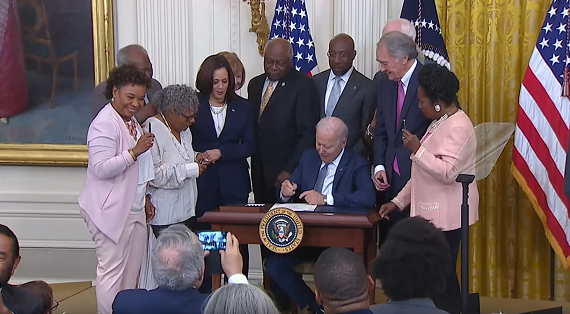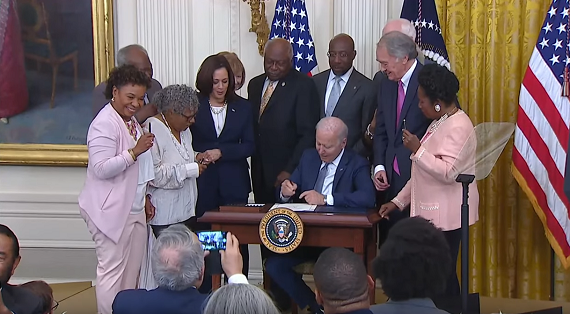As most Americans have learned by now, in their rush to do something politically correct, Congress passed, and the president signed, a bill making “Juneteenth” a federal holiday. Some of us even got a sudden day off as a consequence.
Until a few years ago, hardly anyone had ever heard of “Juneteenth.” Apparently, it was the day when word reached slaves in Galveston, Texas that they had been freed as a result of the Union victory in the American Civil War. For years, it was a holiday scarcely known outside of Texas, and not celebrated except by a few African-American communities, mainly in Texas. But in 2021, as our country, at the instigation of its organs of media and government, hyper-obsesses over race and the long-extinct system of slavery, somebody decided it would be helpful to make a big push to make Juneteenth a new club with which to beat on white Americans for their racial crimes (even though there would have been no emancipation without the bloodshed of hundreds of thousands of white Americans).
It deserves pointing out that, while it is understandable that black communities would celebrate this holiday, from a historical perspective it is based on quite a ludicrous foundation. Slavery in the United States did not end in June of 1865, but in December of that year, when the 13th Amendment was passed. What most Americans do not know, and have never been taught, is that there were several slave states who remained in the union throughout the war, and contributed large numbers of troops to Lincoln’s war effort. These included Kentucky, Missouri, Maryland, and Delaware.
Although, like anyone else, I enjoy having another paid day off, I object to making this a new federal holiday. Two of the reasons I have already mentioned above. In the first place, it will mainly be used simply as a tool for the Social Justice/Critical Race Theory crowd to assault us with reminders of slavery, segregation, etc. In the second place, it is founded upon flat historical ignorance of the actual process of ending the system of chattel slavery in the United States.
But perhaps the main reason why I object to making Juneteenth a federal holiday is because it helps to perpetuate one of the most dangerous, deceptive, and despicable lies that is commonly promulgated by our systems of education and mass media, and naively believed by most Americans. That lie is the belief that the purpose of the Union war effort was to end slavery in America, and that the reason the Southern states took up arms was solely to defend the institution of chattel slavery.
It is interesting to note that, when Fort Sumter was fired upon, there were more slave states (8) in the union than had seceded (7). Virginia, North Carolina, Tennessee, and Arkansas adamantly opposed the secession movement of the Cotton States, but there was one thing they objected to even more: a war of military conquest against other states, which Lincoln instigated by his call for 75,000 volunteers to “end the rebellion.” While it is undeniable that slavery—or, more precisely, Northern violations of the Constitution with respect to slavery, and widespread support of terrorists such as John Brown—were a major reason in the secession of the Southern states, particularly the seven “Cotton States” of the deep South, slavery was not the reason Southern men took up arms in such prodigious numbers in 1861. For this, there was one reason, and one reason only: they were being invaded by a hostile force determined to conquer, subjugate them, and bring them back under the authority of a government entirely inimical to their interests. In other words, Southerners—as their leaders constantly proclaimed—fought for the very best and most justifiable reason to ever go to war: the reason of self-defense.
Did the Union go to war to free the slaves? Let their own leaders speak. In July of 1861, with the war well underway, the United States Congress passed the Crittenden-Johnson resolution, which read in part:
That in this national emergency, Congress, banishing all feelings of mere passion or resentment, will recollect only its duty to the whole country; that this war is not waged on their part in any spirit of oppression, or for any purpose of conquest or subjugation, or purpose of overthrowing or interfering with the rights or established institutions of those States, but to defend and maintain the supremacy of the Constitution, and to preserve the Union with all the dignity, equality, and rights of the several States unimpaired; and that as soon as these objects are accomplished the war ought to cease.
For those who may have missed it, that part about “overthrowing or interfering with the rights or established institutions of those States,” is a direct reference to slavery.
What of Abraham Lincoln, the president whose call for volunteers to subjugate the South after the bloodless bombardment of Fort Sumter precipitated the war? In late 1862, shortly before the Emancipation Proclamation was issued, he wrote these words to Horace Greeley, famous editor of the New York Tribune, who had complained publicly that Lincoln was not doing enough to free the slaves:
I would save the Union. I would save it the shortest way under the Constitution. The sooner the national authority can be restored; the nearer the Union will be “the Union as it was.” If there be those who would not save the Union, unless they could at the same time save slavery, I do not agree with them. If there be those who would not save the Union unless they could at the same time destroy slavery, I do not agree with them. My paramount object in this struggle is to save the Union, and is not either to save or to destroy slavery. If I could save the Union without freeing any slave I would do it, and if I could save it by freeing all the slaves I would do it; and if I could save it by freeing some and leaving others alone I would also do that. What I do about slavery, and the colored race, I do because I believe it helps to save the Union; and what I forbear, I forbear because I do not believe it would help to save the Union. I shall do less whenever I shall believe what I am doing hurts the cause, and I shall do more whenever I shall believe doing more will help the cause. I shall try to correct errors when shown to be errors; and I shall adopt new views so fast as they shall appear to be true views.
In other words, Lincoln’s only driving purpose was to “save the union,” which of course meant establishing the control of the federal government over all the states, with all that that meant for the establishment of the locus of power in Washington, D.C. If freeing the slaves advanced this goal, Lincoln would free them. If it did not, he would happily leave them in chains. This explains why the Emancipation Proclamation very carefully excluded from the number of those proclaimed to be free those slaves in the parts of the South that were under the occupation of Union forces.
Therefore, it is impossible not to conclude that ending slavery was a by-product of the war, and certainly not the reason for which the war was fought. Celebrating Juneteenth will help to perpetuate the Righteous Cause myth of history, that the North fought for the glorious purpose of freeing their fellow men from the chains of slavery, and that Southern white men went to war only for the sinister purpose of keeping black people in bondage. Nothing could be further from the truth. Lincoln went to war to “preserve the Union,” with all the advantages of power and money that would entail. The South went to war because they were invaded by a hostile foreign power. It’s as simple as that, no matter how much mythology the “Righteous Cause” historians try to shove down your throat.








3 Comments